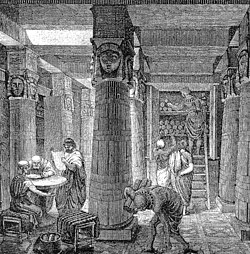Portal:History
The History Portal
History is the systematic study of the past, focusing primarily on the human past. As an academic discipline, it analyses and interprets evidence to construct narratives about what happened and explain why it happened. Some theorists categorize history as a social science, while others see it as part of the humanities or consider it a hybrid discipline. Similar debates surround the purpose of history—for example, whether its main aim is theoretical, to uncover the truth, or practical, to learn lessons from the past. In a more general sense, the term history refers not to an academic field but to the past itself, times in the past, or to individual texts about the past.
Historical research relies on primary and secondary sources to reconstruct past events and validate interpretations. Source criticism is used to evaluate these sources, assessing their authenticity, content, and reliability. Historians strive to integrate the perspectives of several sources to develop a coherent narrative. Different schools of thought, such as positivism, the Annales school, Marxism, and postmodernism, have distinct methodological approaches.
History is a broad discipline encompassing many branches. Some focus on specific time periods, such as ancient history, while others concentrate on particular geographic regions, such as the history of Africa. Thematic categorizations include political history, military history, social history, and economic history. Branches associated with specific research methods and sources include quantitative history, comparative history, and oral history.
History emerged as a field of inquiry in antiquity to replace myth-infused narratives, with influential early traditions originating in Greece, China, and later in the Islamic world. Historical writing evolved throughout the ages and became increasingly professional, particularly during the 19th century, when a rigorous methodology and various academic institutions were established. History is related to many fields, including historiography, philosophy, education, and politics. (Full article...)
Featured picture
Did you know (auto generated)

- ... that Lucien Laurent scored the first goal in FIFA World Cup history during the inaugural game of Group 1 of the 1930 World Cup?
- ... that the Al Qarara Cultural Museum, housed in a former grain silo, contained 6000 years of history?
- ... that during the first tour to the Soviet Union by any American ballet company, Lupe Serrano danced the first encore in the American Ballet Theatre's history?
- ... that the NFL listed the 4th and 26 game as one of the greatest in the first 100 years of its history?
- ... that the Oxtongue River, historically a canoe route for indigenous people, is still used for recreational canoeing?
- ... that during the early-access period of Hogwarts Legacy, the game set a new record on Twitch with the largest number of concurrent viewers for a single-player game in history?
Irakli Tsereteli (2 December [O.S. 20 November] 1881 – 20 May 1959) was a Georgian politician and a leading spokesman of the Social Democratic Party of Georgia and later Russian Social Democratic Labour Party (RSDLP) during the era of the Russian Revolutions.
Tsereteli was born and raised in Georgia when it was part of the Russian Empire. A member of the Menshevik faction of the RSDLP, Tsereteli was elected to the Duma in 1907, where he gained fame for his oratorical skill. Shortly after entering the Duma, Tsereteli was arrested and charged with conspiracy to overthrow the Tsarist government, and exiled to Siberia. A dedicated Social Democrat who believed in the Menshevik ideology, Tsereteli was one of the leading figures of the movement in Russia. In 1915, during his Siberian exile, Tsereteli formed what would become known as Siberian Zimmerwaldism, which advocated for the role of the Second International in ending the war. He also developed the idea of "Revolutionary Defensism", the concept of a defensive war which only allowed for the defence of territory, and argued it was not being utilized. (Full article...)
On this day
May 1: Beltane and Samhain in the Northern and Southern Hemispheres, respectively; Maharashtra Day in Maharashtra, India (1960); International Workers' Day, Law Day, Loyalty Day and National Day of Prayer (2025) in the United States
- 305 – Diocletian and Maximian retired as co-rulers of the Roman Empire, being succeeded by Galerius and Constantius Chlorus.
- 1794 – War of the Pyrenees: France regained nearly all the land it lost to Spain the previous year with its victory in the Second Battle of Boulou.
- 1931 – New York City's Empire State Building (pictured), at the time the tallest building in the world, opened.
- 1974 – Argentine president Juan Perón expelled Montoneros from a demonstration in the Plaza de Mayo in Buenos Aires, forcing the group to become a clandestine organization.
- Alexander William Williamson (b. 1824)
- Anna Jarvis (b. 1864)
- Eldridge Cleaver (d. 1998)
Selected quote
What transforms this world is — knowledge. Do you see what I mean? Nothing else can change anything in this world.
— Yukio Mishima, Japanese author
Related portals
More Did you know...
- ... that the underground Fortress of Mimoyecques (pictured) was built by Nazi Germany to bombard London with 10 shells a minute using the V-3 supergun?
- ... that Howard P. Perry was the first African American recruit in the United States Marine Corps?
- ... that the Chester city walls form the most complete circuit of Roman and medieval defensive town walls in Britain?
- ... that China's first female director was adopted by the first Premier of the People's Republic of China?
- ... that the Medieval Merchant's House in Southampton was being used as a brothel when bomb damage during the Blitz revealed the building's important medieval architecture?
- ... that the Sumerian "river of paradise", the Hubur, derived partly from real geography before becoming a demonic fantasy?
- ... that Bill Foley's photograph "The Last Smile" shows Anwar Sadat only moments before his assassination?
- ... that the 1911 Sarez earthquake triggered a huge landslide, forming the tallest dam in the world?
Topics
Categories

History • By period • By region • By topic • By ethnic group • Historiography • Archaeology • Books • Maps • Images • Magazines • Organizations • Fictional • Museums • Pseudohistory • Stubs • Timelines • Chronology • People • Wikipedia historians
WikiProjects
![]() WikiProject History •
Ancient Near East • Australian History • Classical Greece and Rome • Dacia • Former countries • History of Canada • Chinese history • European history • Heraldry and vexillology • Indian history • Jewish history • Medieval Scotland • Mesoamerica • Military history • Middle Ages • History of Science
WikiProject History •
Ancient Near East • Australian History • Classical Greece and Rome • Dacia • Former countries • History of Canada • Chinese history • European history • Heraldry and vexillology • Indian history • Jewish history • Medieval Scotland • Mesoamerica • Military history • Middle Ages • History of Science
WikiProject Time • Days of the Year • Years
WikiProject Biography • Composers • Political figures • Saints • United States Presidents
Things you can do
 |
Here are some tasks awaiting attention:
|
Associated Wikimedia
The following Wikimedia Foundation sister projects provide more on this subject:
-
Commons
Free media repository -
Wikibooks
Free textbooks and manuals -
Wikidata
Free knowledge base -
Wikinews
Free-content news -
Wikiquote
Collection of quotations -
Wikisource
Free-content library -
Wikiversity
Free learning tools -
Wiktionary
Dictionary and thesaurus






















































